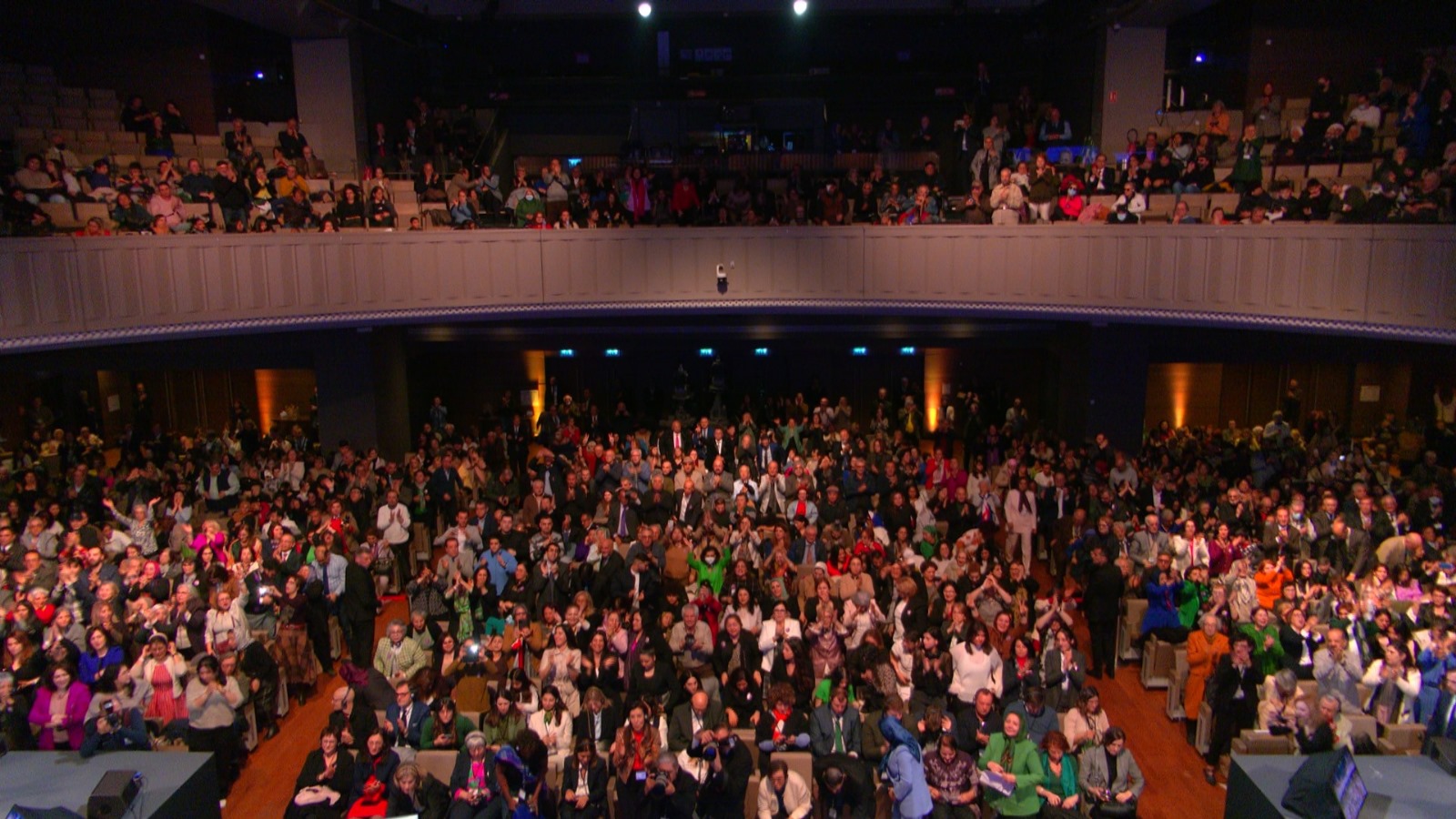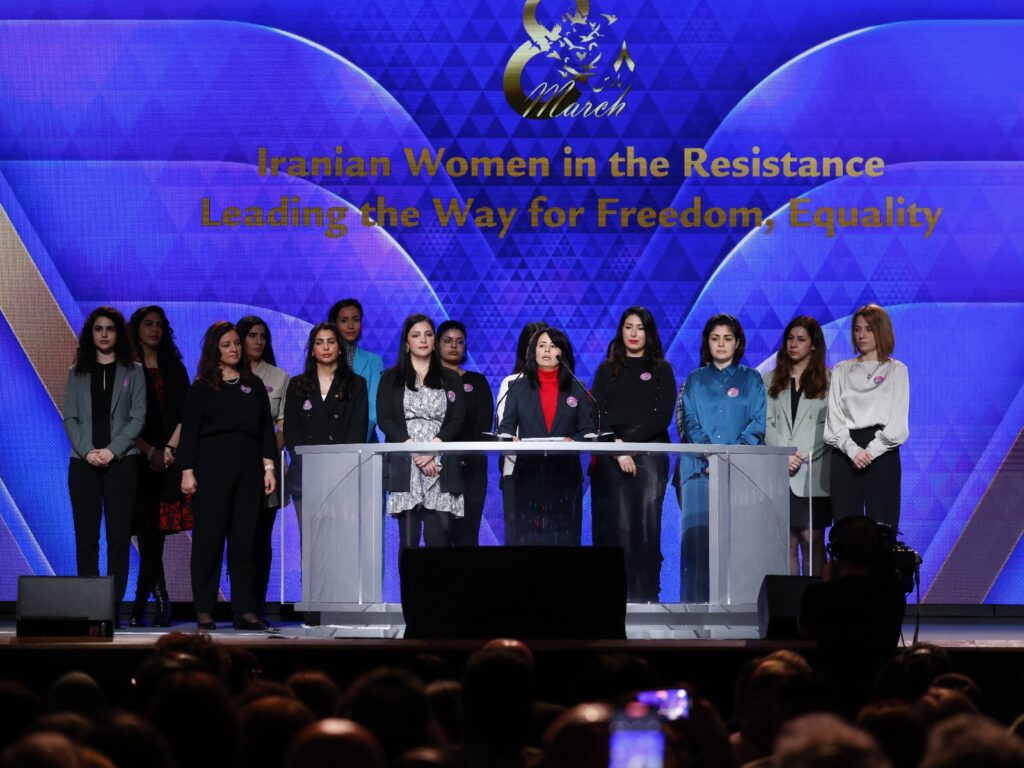News Report on Women’s Gathering in Solidarity with Iranian Women on IWD
On February 24th, 2024, a gathering was held in Paris in solidarity with Iranian women on the occasion of International Women’s Day. 41 distinguished women, including former presidents, prime ministers, ministers, and current members of parliament from 24 nations, graced this powerful women’s conference. The keynote speaker was Maryam Rajvi, President-elect of the National Council of Resistance of Iran (NCRI). In addition, the list of speakers included representatives from various Iranian women’s associations in Europe, representing in particular the burgeoning new generation working for change in Iran.
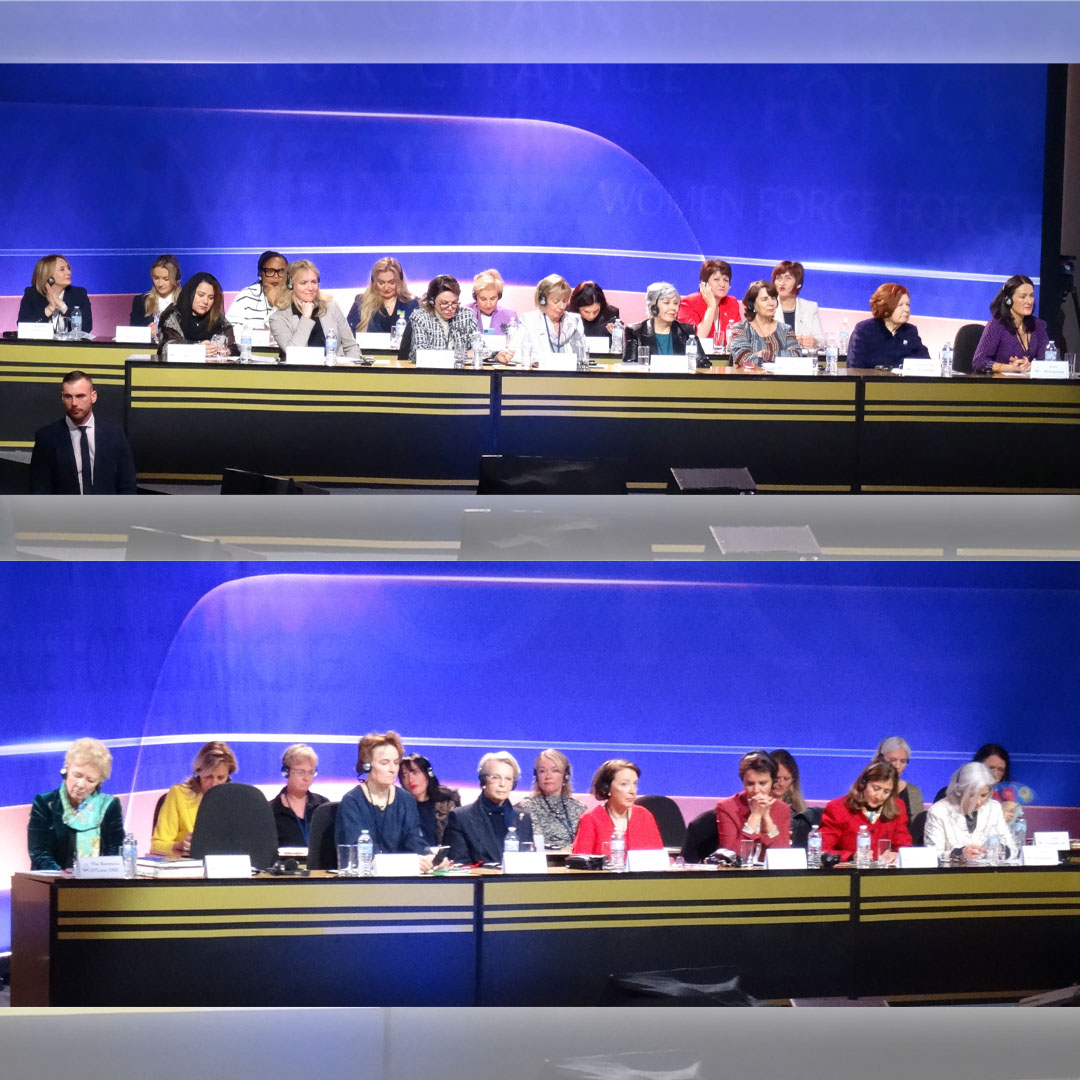
List of speakers in the Women’s gathering in solidarity include:
Najat Vallaud Belkacem, former French Minister of National Education, Higher Education and Research and Minister of Women’s Rights, Michèle Alliot-Marie, Former Interior, Defence, Foreign and Justice Minister of France, Anneli Jäätteenmäki, former Prime Minister of Finland, Vaira Vīķe-Freiberga, former President of Latvia, Rosalía Arteaga Serrano, former President of Ecudor, Ingrid Betancourt, Former Senator and Colombian Presidential Candidate, Dominique Attias, Chair of the Board of Directors at the European Lawyers Foundation as well as President of European Law Society Federation as of March 2021, Linda Chavez, Former White House Director of Public Liaison, Ana Helena Chacon Echeverria, former Vice President of Costa Rica, Nobel Peace Laureate, best known for leading a movement that brought together Christian and Muslim women to play a pivotal role in ending Liberia’s devastating, fourteen-year civil war in 2003, The Baroness O’Loan DBE, Member of the UK House of Lords, Michèle de Vaucouleurs, Former President of the parliamentary Committee for a Democratic Iran (CPID) at the French National Assembly, Kathleen Depoorter, Member of the Federal Parliament of Belgium, Dorien Rookmaker, Member of the European Parliament from the Netherlands, Senator Erin McGreehan, Spokesperson of the Irish Senate on Equality and Children’s Affairs, Judy Sgro, Member of Canadian Parliament and former Minister of Citizenship and Immigration, Candice Bergen, former Minister of State for Social Development and former leader of the Conservative Party of Canada, Naike Gruppioni, Member of Parliament of Italy, Eva Durán Ramos, President of AFAMMER, Permanent MP at the Council of Europe from Spain, Karin Liltorp, Member of Parliament from Denmark, Thorgerdur Katrin Gunnarsdottir, Member of Parliament and former Minister of Culture of Iceland, Sihem Badi, former Minister for Women’s Affairs of Tunisia, Nargis Nehan, former Acting Minister of Mines and Petroleum of Afghanistan, Malgorzata Krzyzowska, vice-President of the foreign committee of the Polish Supreme Bar Council representing the Bar Council, Christina Blacklaws, former President of the Law Society of England and Wales, Ganna Yudkivska, Vice-Chair on Follow-Up of the UN Working Group on Arbitrary Detentions and former Judge of the European Court of Human Rights, The Hon. Professor Sara Chandler, Qualified Solicitor and member of the Law Society of England and Wales, Katya De Giovanni, Member of Parliament of Malta and Chair of the Social Affairs Committee, Iulia Dascalu and Maria Pancu, Members of Parliament of Moldova, Zinat Mir-Hashmei, NCRI member and Editor in Chief of Nabard-e Khalq, the official publication of the Fedayeen Organization of Iran, Felor Sadoudi, NCRI member, Elaheh Zabihi, Senior Lecturer of Computer Sciences at the University of London and President of the Women for Free Iran Association, Asal Rezapour, speaker of Delegation of the Iranian Youths, Vida Nik Talean, speaker of Iranian Women’s Delegation.
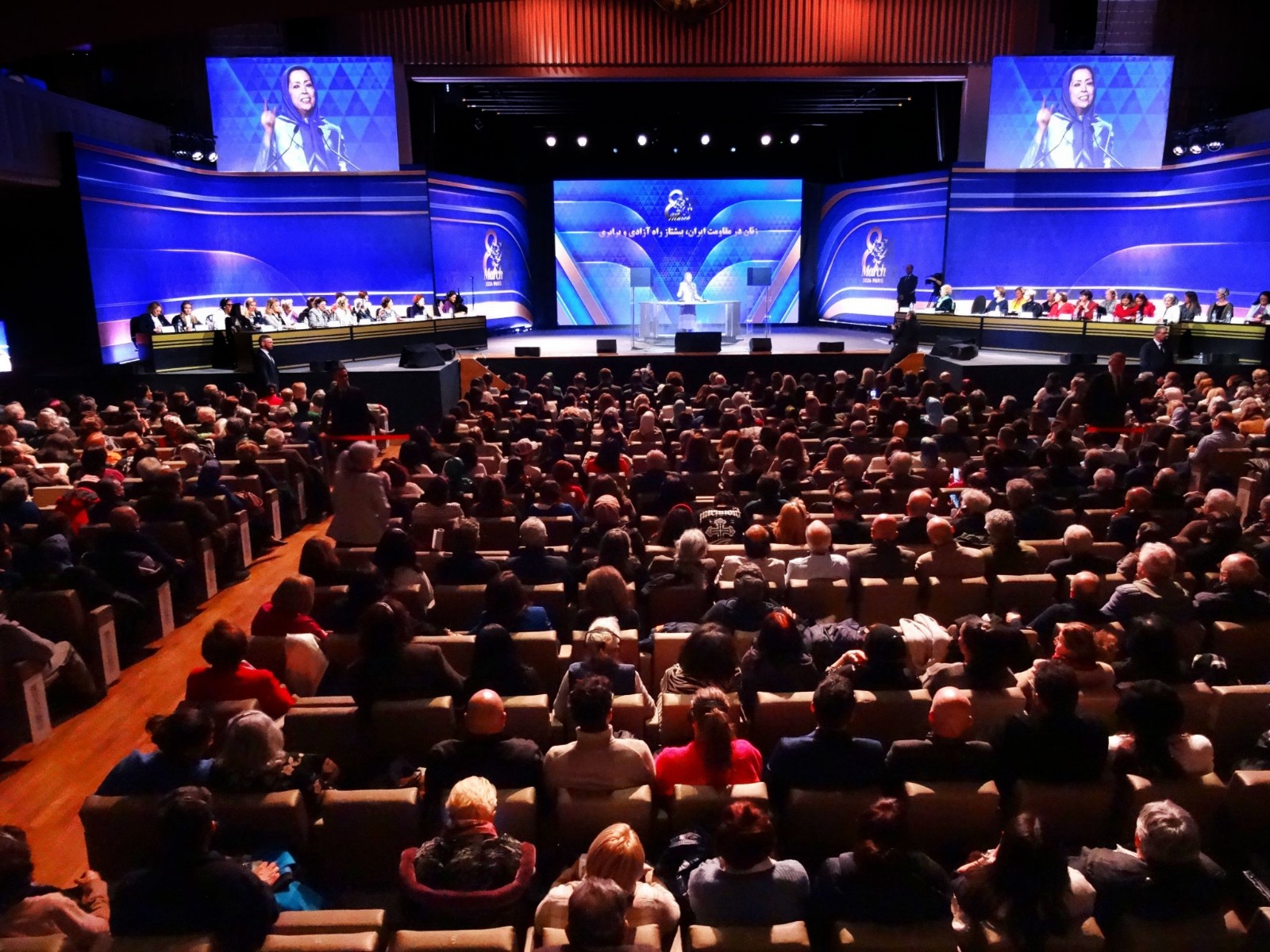
Excerpts of Maryam Rajavi’s remarks appear below:
The experience of the Iranian Resistance has demonstrated that the struggle against dictatorship, as seen in the ongoing fight against Islamic fundamentalists ruling Iran, and the fight for equality are not two separate endeavors. Because it is impossible to combat religious tyranny without unleashing the immense energy of pioneering women and men. A progressive movement aiming to challenge religious tyranny must confront the reactionary ideology, which is rooted in gender discrimination and selfishness, and prioritizes individual interests over the collective interest. It is imperative that such a movement rejects all traces and elements of this ideology in both its philosophical outlook and interactions. For equality to be realized, it is crucial to abandon reactionary and objectifying views of women. Rather, we should foster a culture and engage in interactions where women are seen as independent, not reliant on anyone else. Women must not be seen as possessions but as independent, capable of steering their own destinies and leading the world to a better future….
The first casualties of the mullahs’ ruthless exploitation, the shattered economy, unemployment, and homelessness, are the oppressed women throughout Iran.
From here, I address Iran’s awakened women, especially the pioneering young generation: The salvation of millions of Iranian women, ensnared by oppression, poverty, and exploitation, lies in your hands. Rise up and let your cries echo across Iran and the entire world: No to compulsory hijab, no to imposed religion, and no to compulsory government. We can and we must overthrow the Velayat-e Faqih regime….
These days, with great fanfare, the mullahs are holding a sham trial in absentia in Tehran for 104 members and officials of the PMOI and the Iranian Resistance. Their alleged crime is fighting to overthrow the regime. One of the most significant charges formally leveled by the regime’s prosecutor against this movement is that it has accepted women’s leadership. They are correct. Women’s leadership has challenged their regime’s existence. The extensive involvement of women in the movement for regime change is neither random nor spontaneous. It is the result of a rich history and a series of precedents that have positioned Iranian women at the forefront of the uprisings….
The PMOI women, in an unyielding and emancipatory struggle, have rebelled against a culture entrenched in gender discrimination and individuality, and represent a new revolution….
In a nutshell, the essence of their experience can be summarized in the motto of “we can, and we must.” They have succeeded in overcoming the inhibiting force of self-doubt, and achieving a renewed belief in themselves.
Amidst the shadows of misogyny, jealousy, exclusion, and harmful rivalry, they have adopted sacrifice and compassionate sisterly emotions as their creed.
They have moved beyond antiquated values like appearance and age that drain their emotional energy….
They are at the forefront of embracing significant responsibilities, setting an example in collective management. They eschew self-centered ambitions and the mindset of “me-first” and “everything-for-me.” Yet, in sacrifice and responsibility, they always lead and are the first to step forward. They have managed to cultivate within themselves the ability to listen to others, which is the key to advanced relationships and a supreme human capability. They have come to understand that differences of opinion, a diversity of methods, and criticisms do not drain energy but rather act as the source of strength and advancement….
… Dismantling the grip of inequality is impossible without a substantial leap forward. This leap entails ascendancy of women, which carried particular weight in our struggle against the misogynistic dictatorship. The active and equal participation of women in political leadership and other areas of responsibility depended on it…..
Women and men, who rebel against the reactionary worldview, and an ideology that objectifies women, will pave the path to equality.
I believe that one day, the notion that women were seen as commodities will be regarded as a shameful chapter in human history. And every woman will be recognized as an individual with the right to choose and with full authority over her own life.
I believe that equal participation of women in political and economic spheres guarantees freedom, democracy, security, justice, and progress.
I believe that defeating fundamentalism and the religious tyranny ruling Iran is possible, through the leadership, resilience, and emancipation of Iranian women and men.
I believe women serve as the pivotal force driving the transformation of destiny in our time.
The most glorious experience of my life is witnessing the tireless struggle of the women and men in this movement toward emancipation and the creation of relationships devoid of discrimination and inequality.
Armed with this experience, I declare, with more hope than ever before, that the dawn of freedom and the arrival of democracy and equality in Iran are inevitable and certain with the democratic revolution of the Iranian people.
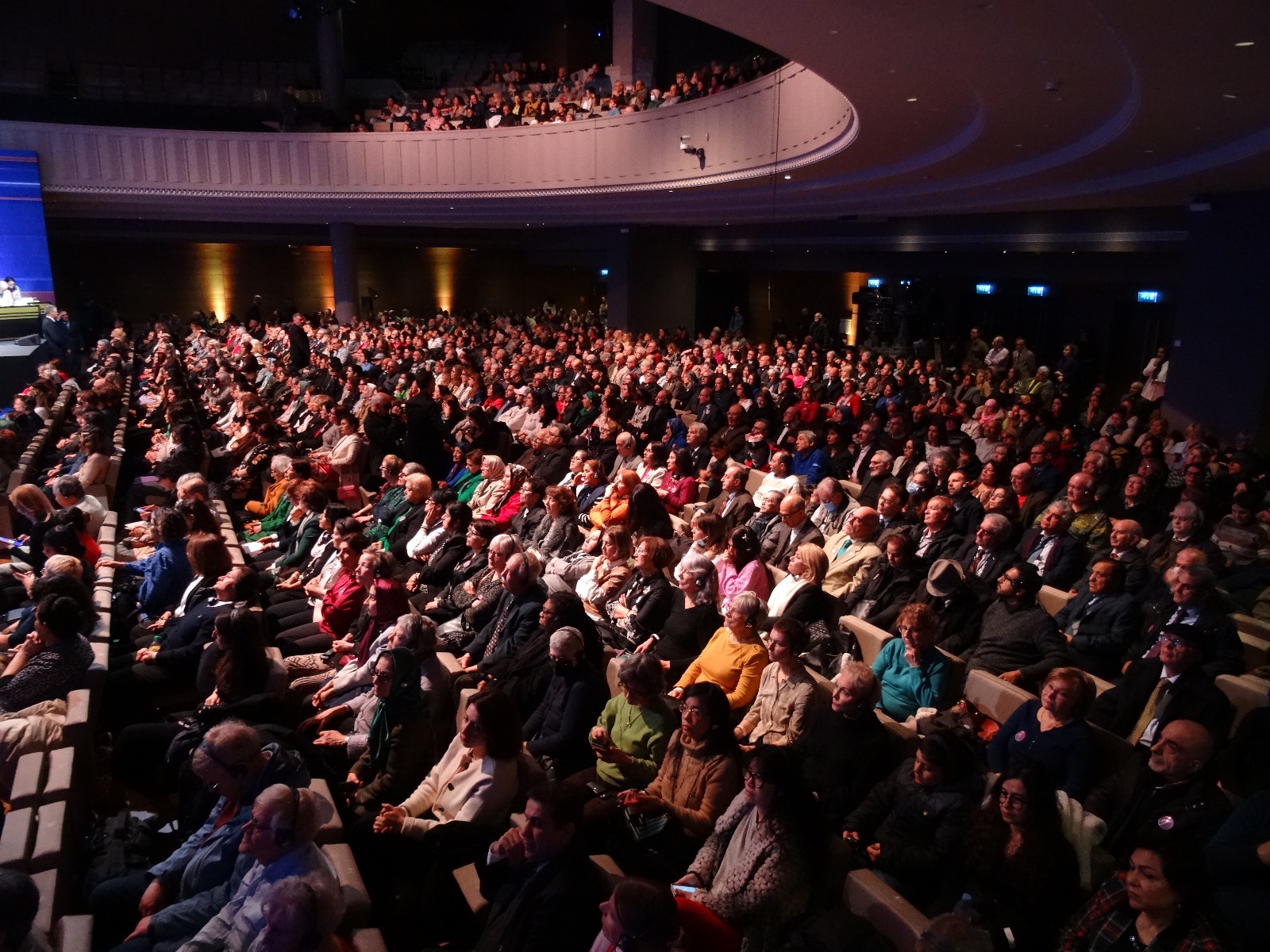
Remarks of solidarity with Iranian women and Maryam Rajavi, made by other speakers led to furious reactions from the Iranian regime’s political proxies operating under different pretexts, demonstrating regime’s fear of the NCRI and the PMOI.
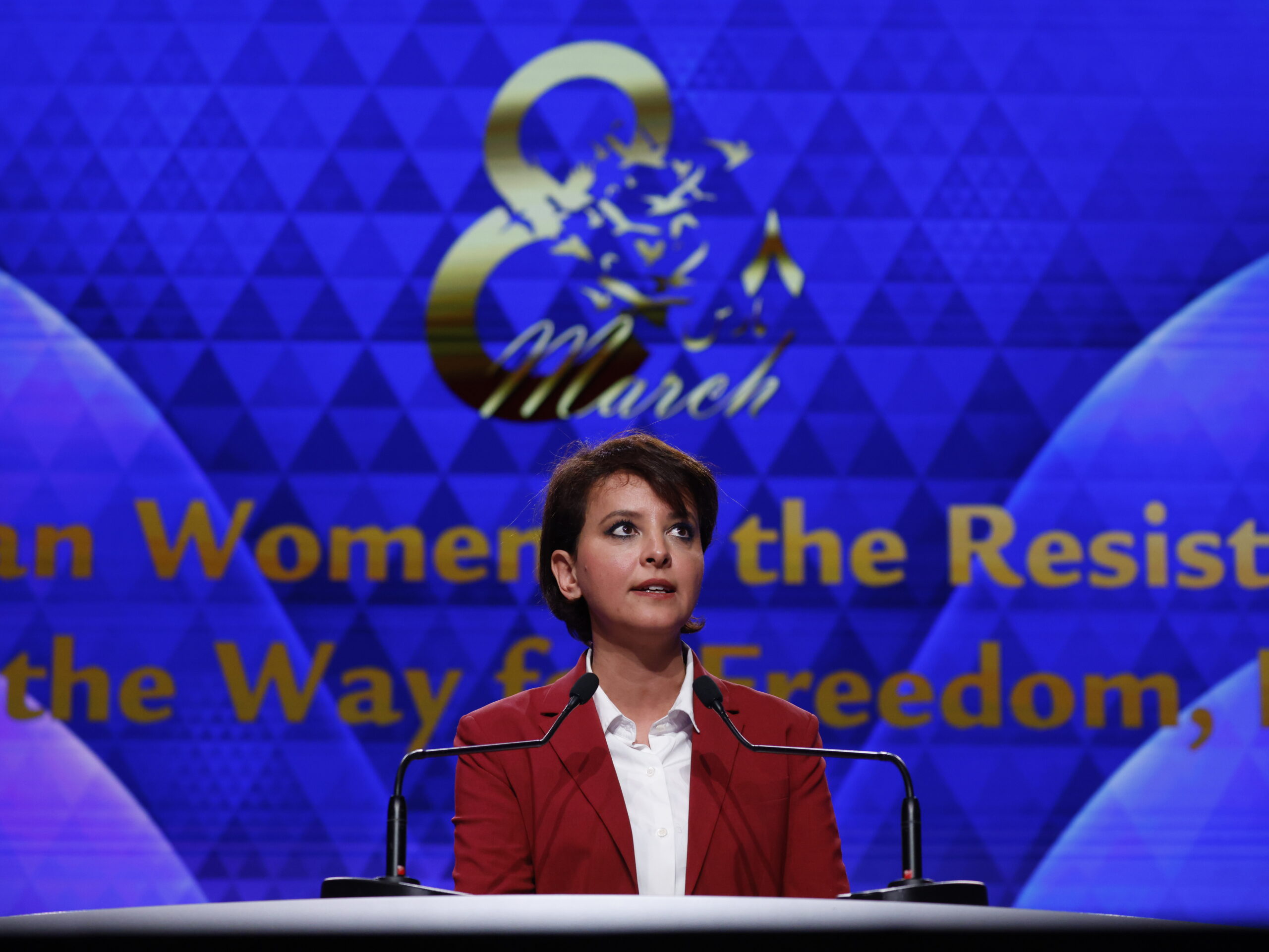 Najat Vallaud Belkacem, former French Minister, stated, “Iranian women, who have been fighting against the regime for more than 40 years, know that their demands will go unheeded as long as this misogynistic regime remains in power. They know that gender equality and the quest for freedom and democracy are closely intertwined. They know that the problem is political, and therefore the response must also be a political struggle. So, as we have heard once again, they are determined to overthrow this regime and establish a democratic republic.”
Najat Vallaud Belkacem, former French Minister, stated, “Iranian women, who have been fighting against the regime for more than 40 years, know that their demands will go unheeded as long as this misogynistic regime remains in power. They know that gender equality and the quest for freedom and democracy are closely intertwined. They know that the problem is political, and therefore the response must also be a political struggle. So, as we have heard once again, they are determined to overthrow this regime and establish a democratic republic.”
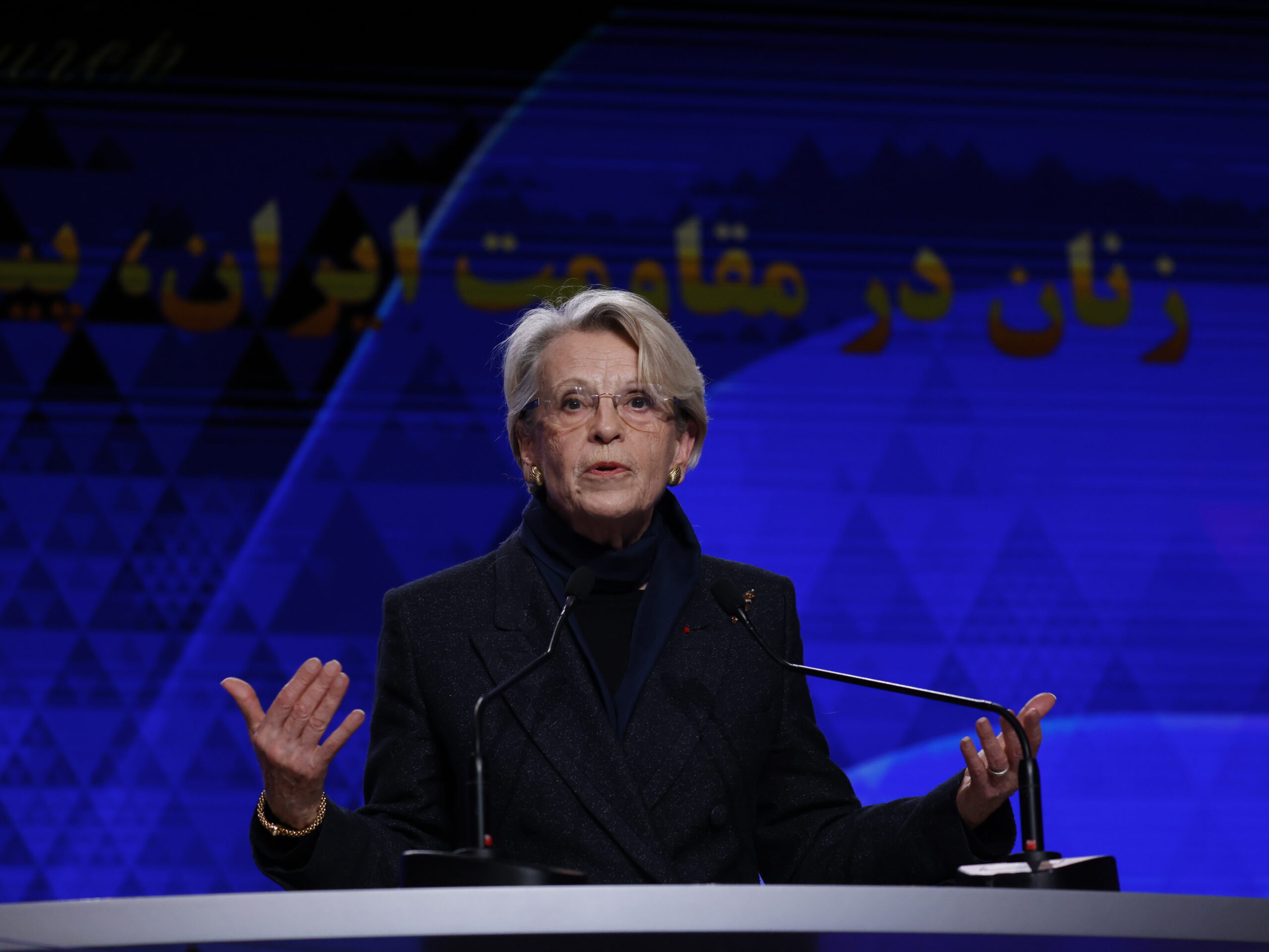 Michele Alliot-Marie, also a former French Minister, addressed the Iranian audience and said: “Freedom, gender equality, secularism – these are the rights of every human being. And that’s what motivates you in your day-to-day work, through all the actions you can take. Resisting against those who deny these rights is not only a necessity for us but also a duty.”
Michele Alliot-Marie, also a former French Minister, addressed the Iranian audience and said: “Freedom, gender equality, secularism – these are the rights of every human being. And that’s what motivates you in your day-to-day work, through all the actions you can take. Resisting against those who deny these rights is not only a necessity for us but also a duty.”
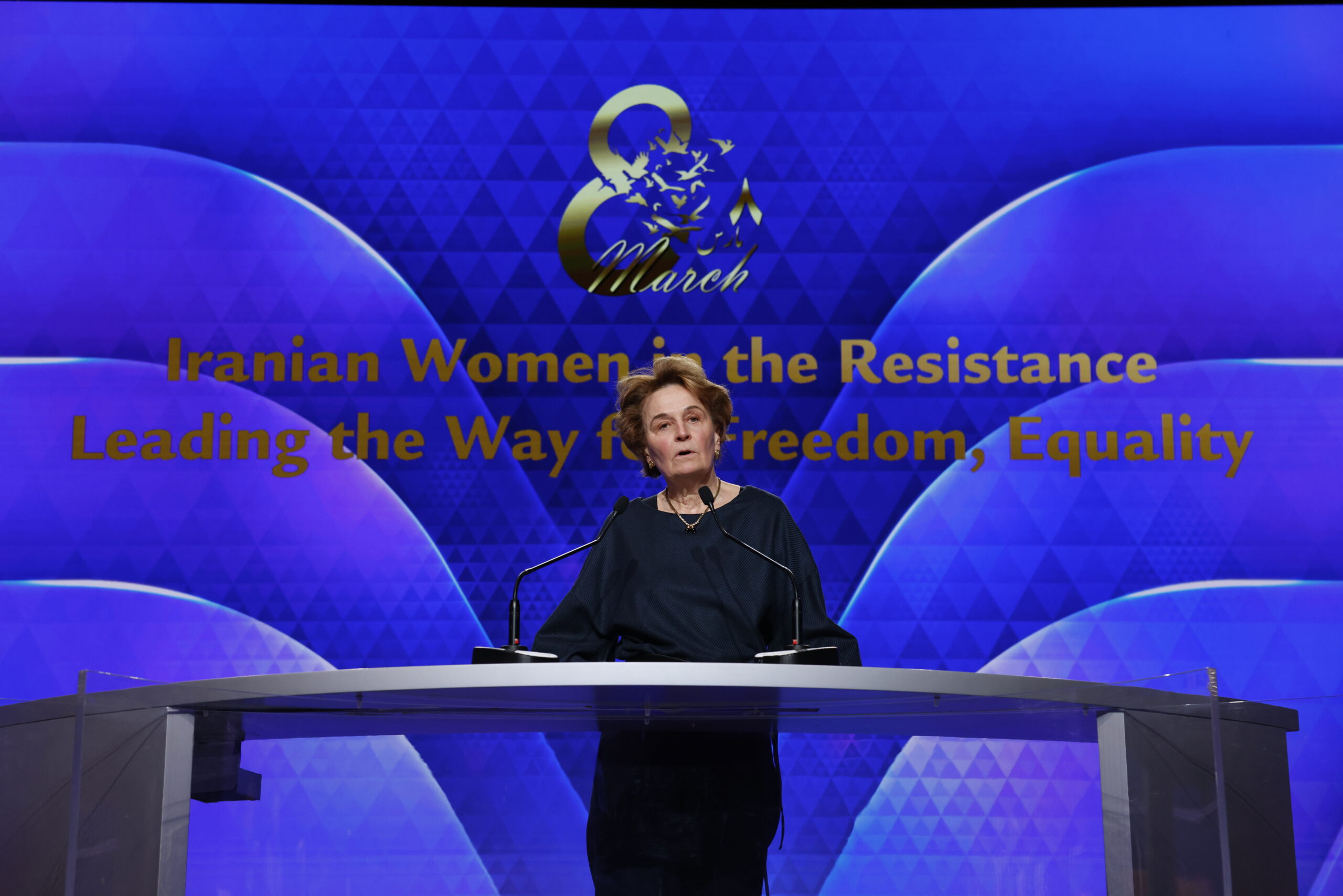 Anneli Jäätteenmäki, former Prime Minister of Finland, stated: “The regime does not allow any rights, Neither human dignity for women. We have all come here to give support for Iranian women, to give Support for women’s struggle to get back their dignity and human rights, to let men and women live in peace without political executions, political killings and imprisonments. And I am sure the sound of change is coming.”
Anneli Jäätteenmäki, former Prime Minister of Finland, stated: “The regime does not allow any rights, Neither human dignity for women. We have all come here to give support for Iranian women, to give Support for women’s struggle to get back their dignity and human rights, to let men and women live in peace without political executions, political killings and imprisonments. And I am sure the sound of change is coming.”
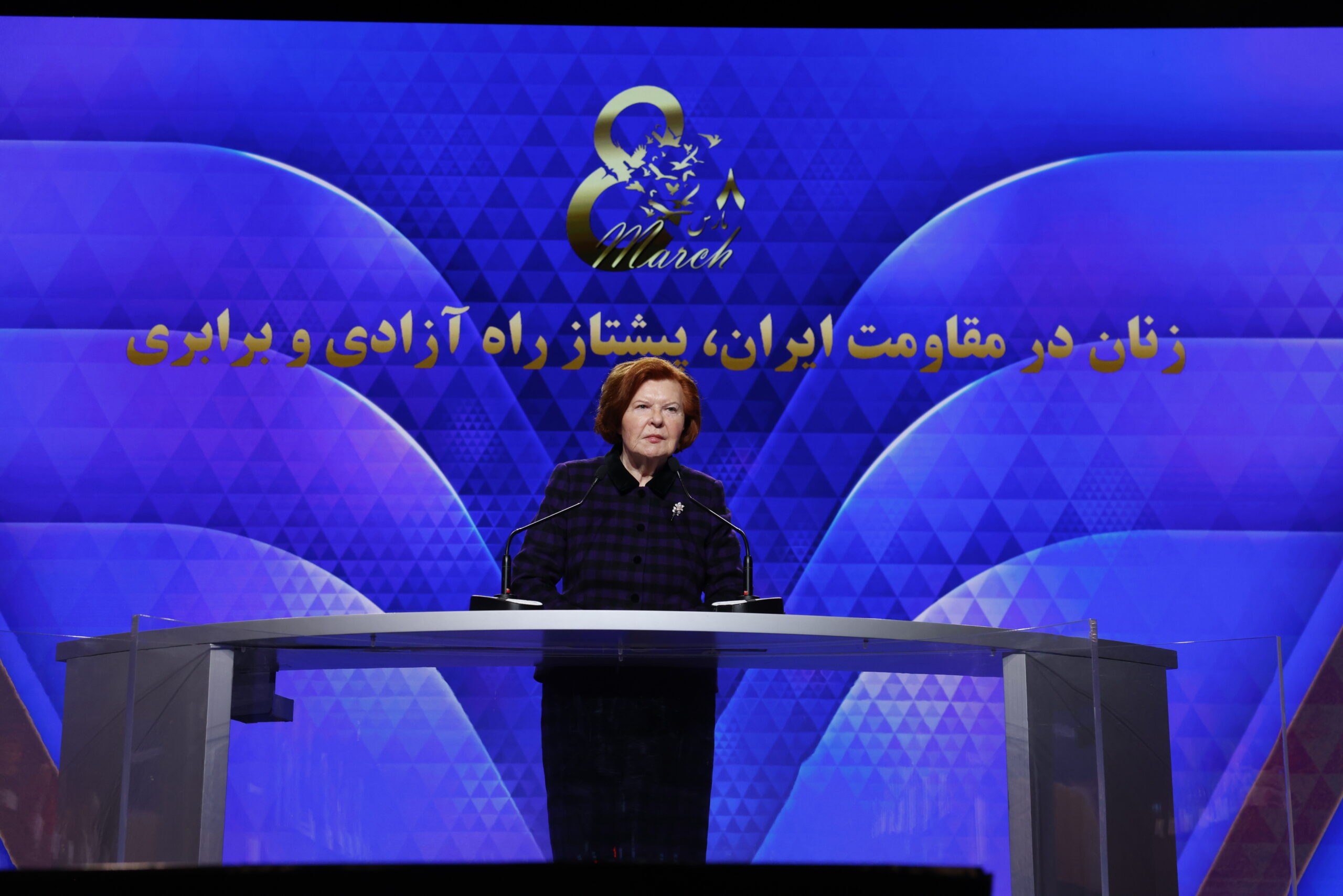
Former President of Latvia, Ms Vīķe-Freiberga, stated: “Today, Iran is not only suffering under a brutal theocracy that has dehumanized half of its population, particularly women, but it is also responsible for delivering weapons of destruction to the brutal theocracy in Russia, which is now known as the Putinist Federation. You will prevail, those who are working and fighting for your nation. You must prevail because humanity cannot afford to lose you.”
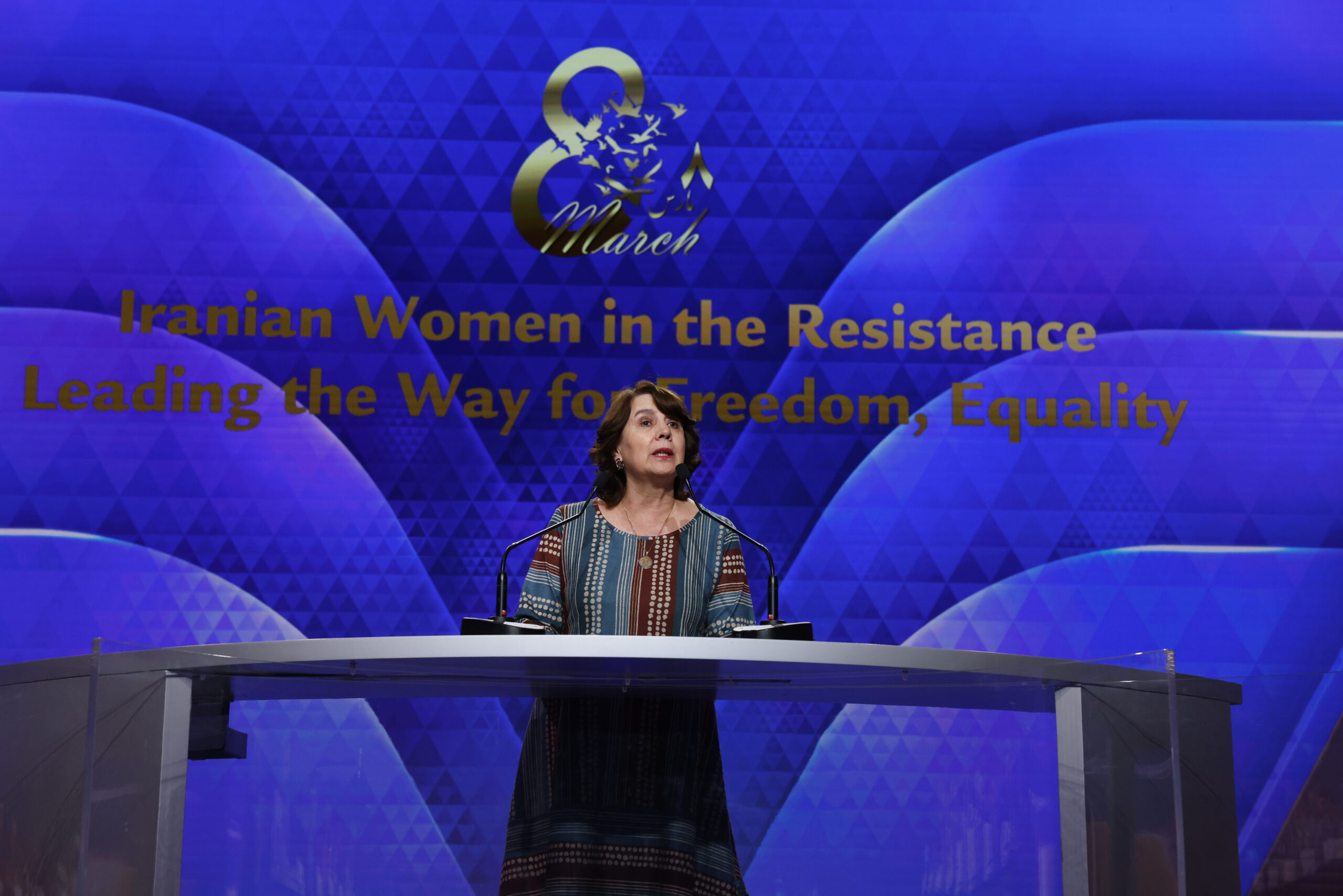
Rosalía Arteaga Serrano, former President and Vice-President of Ecuador, expressed solidarity with the women and people of Iran, saying: “The National Council of Resistance of Iran, led by Mrs. Maryam Rajavi, has shown courage and vision in its fight for the consolidation of rights for all, especially for women in Iran. Its slogan, ‘We can and must,’ reflects the sentiments of an oppressed community in search of their rights. From Latin America, and particularly from Ecuador, the country located at the center of the world, I want to express my solidarity with the women and the people of Iran.”
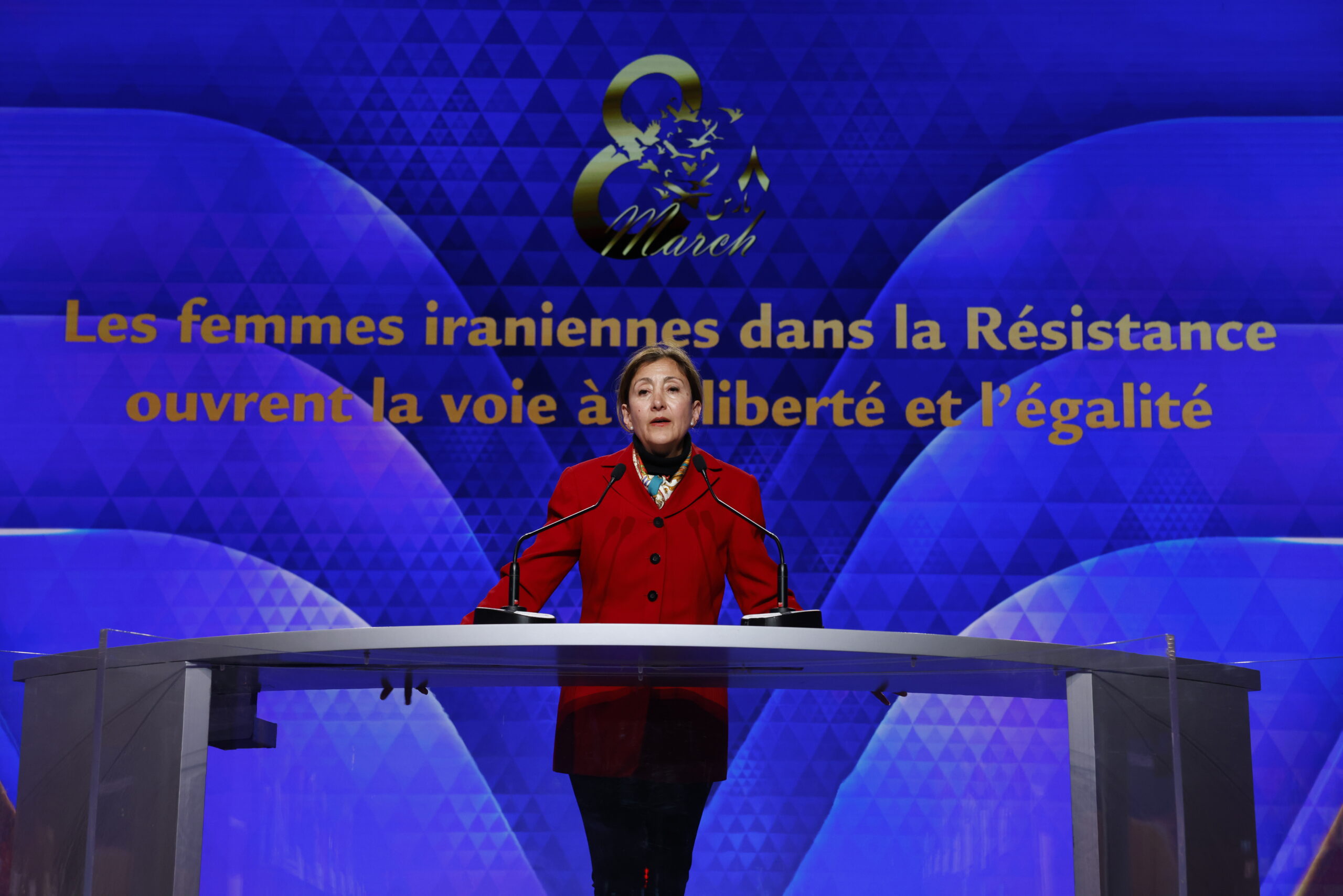
Ingrid Betancourt, who has researched and studied the case of the main Iranian opposition group, the People’s Mojahedin Organisation of Iran (PMOI) for more than 10 years, spoke about her personal experience regarding the Iranian regime’s disinformation campaign against Maryam Rajavi and the PMOI women and said: ” When they tell us that this is a personality cult, fake news, and demonization, it makes me sick because I know the truth. I have seen Maryam Rajavi as a woman who is not above others. She serves, always serves, her peers. And not only that, everyone who has entered this venue has seen the work of the ladies of the PMOI. These women have been empowered by Maryam Rajavi to take leadership, take action, and make decisions for the well-being of a large community.” In another part of her remarks, she said “When we see the Iranian women leading this resistance movement, we have to question ourselves how this happened. This is because they have had a role model. The role of Maryam Rajavi has been so vital in women to empower themselves and to lead this movement. I have been subject to fake news. I am here because after 15 years of being with you I know we are in the right place. Now a day, when I face the lies and demonization, against Maryam Rajavi, I feel sick. The women of Iranian Resistance are inspired by Maryam Rajavi. This is not a gender war, but a cultural revolution.”
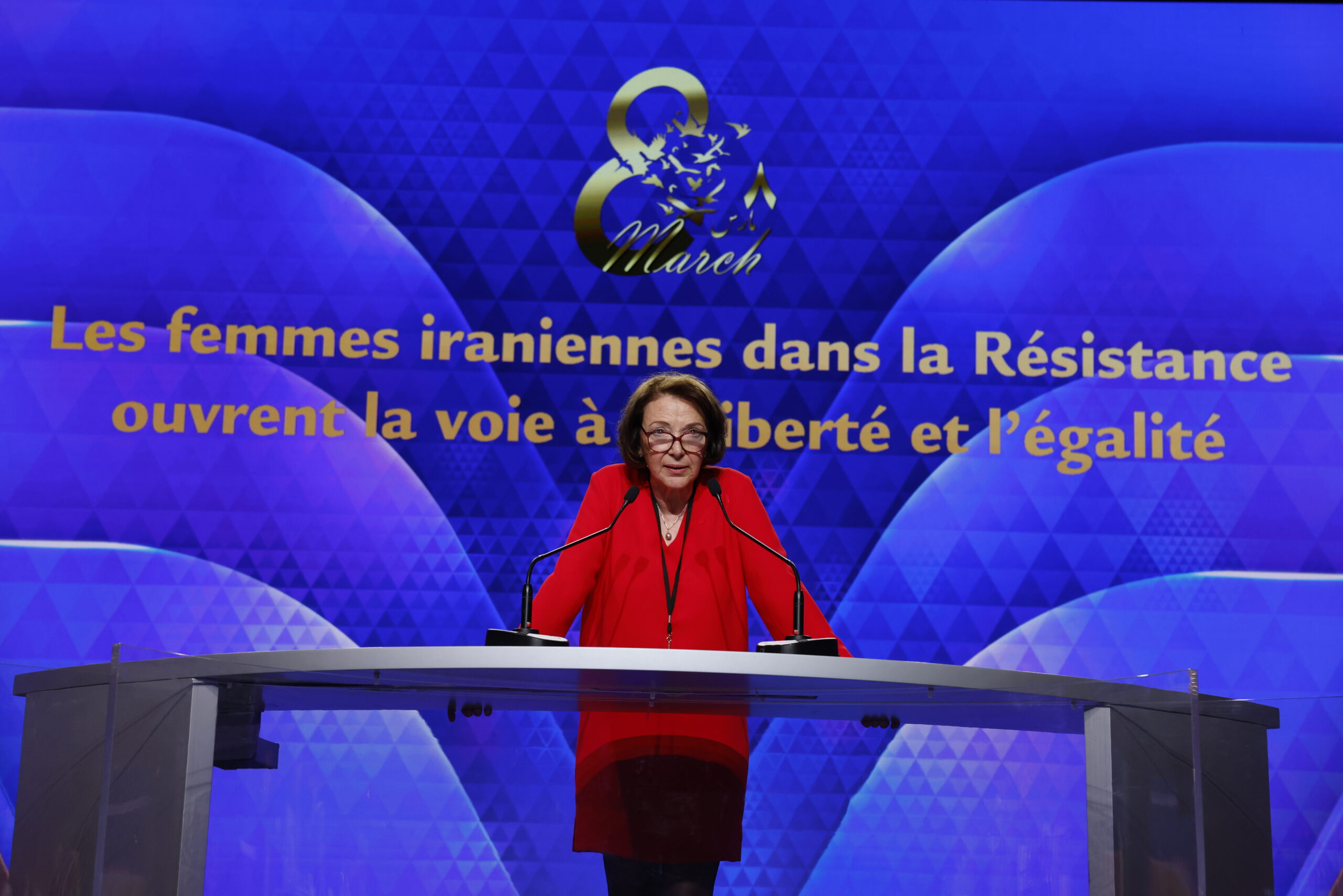
While admiring female political prisoners in Iran who do not surrender to the Mullahs, Dominique Attias, a well-known French jurist, addressed the Iranian female audience and said: “How many of you, girls and women of the Iranian Resistance in France and around the world, are sacrificing your well-being and family lives for an ideal to which you have devoted your lives? To give the people of Iran back their sovereignty and freedom. You want neither the shah nor the mullah. You are the heirs of a thousand-year-old Iran, where women have always fought tyranny. You are following in the footsteps of those who, as in 1906, more than a century ago at the start of the constitutional revolution, took to the streets with arms to fight against the oppressors of the time. You had courage and modernity, with enlightened men at your side, whom I also salute. You had the courage and great modernity to choose a woman as your leader, Mrs. Maryam Rajavi, who has been advocating for the equality of women and men in a modern Iran for many years.”
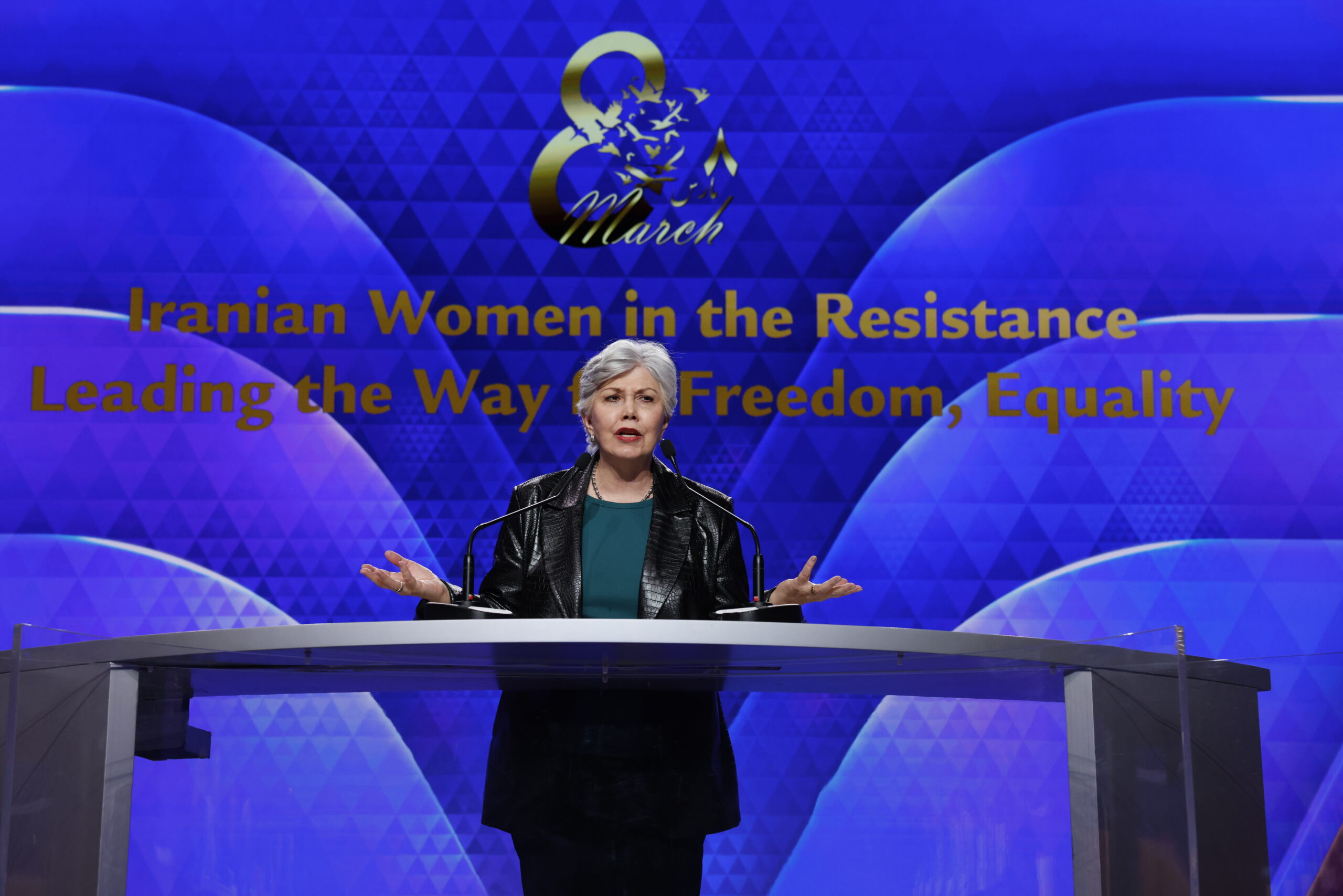 Stressing that there will not be change in Iran without regime change, Linda Chavez, who served as White House Director of Public Liaison, quoted the appeasers of the Mullahs as saying, “Iran is not really ready for regime change. There really isn’t an organized force that can bring about regime change.” Her reply was, “Well, apparently they have never been to an NCRI meeting or seen the members of the PMOI because they are ready at a second’s notice to be able to execute that kind of regime change.” She also spoke about the disinformation campaign of the regime against the Iranian resistance and said, “I too have had those kinds of people coming to tell me, ‘Oh, you know, you really have to be very careful. These people are a little sketchy. Maybe you need to avoid them. You really ought to do some research and look into it more carefully. And oh, by the way, they have no support in Iran whatsoever.'” She then replied, “I always find that very strange because when I come to the conferences, often there are satellite views of people in the streets of cities in Iran. There are hundreds, thousands of people. And the movement has over the last year begun to attract more people. But I also think that it’s important to understand that if this movement were not a threat to the mullahs in Tehran, then why is it they spend so much money and effort and even violence to try to stop that movement?”
Stressing that there will not be change in Iran without regime change, Linda Chavez, who served as White House Director of Public Liaison, quoted the appeasers of the Mullahs as saying, “Iran is not really ready for regime change. There really isn’t an organized force that can bring about regime change.” Her reply was, “Well, apparently they have never been to an NCRI meeting or seen the members of the PMOI because they are ready at a second’s notice to be able to execute that kind of regime change.” She also spoke about the disinformation campaign of the regime against the Iranian resistance and said, “I too have had those kinds of people coming to tell me, ‘Oh, you know, you really have to be very careful. These people are a little sketchy. Maybe you need to avoid them. You really ought to do some research and look into it more carefully. And oh, by the way, they have no support in Iran whatsoever.'” She then replied, “I always find that very strange because when I come to the conferences, often there are satellite views of people in the streets of cities in Iran. There are hundreds, thousands of people. And the movement has over the last year begun to attract more people. But I also think that it’s important to understand that if this movement were not a threat to the mullahs in Tehran, then why is it they spend so much money and effort and even violence to try to stop that movement?”
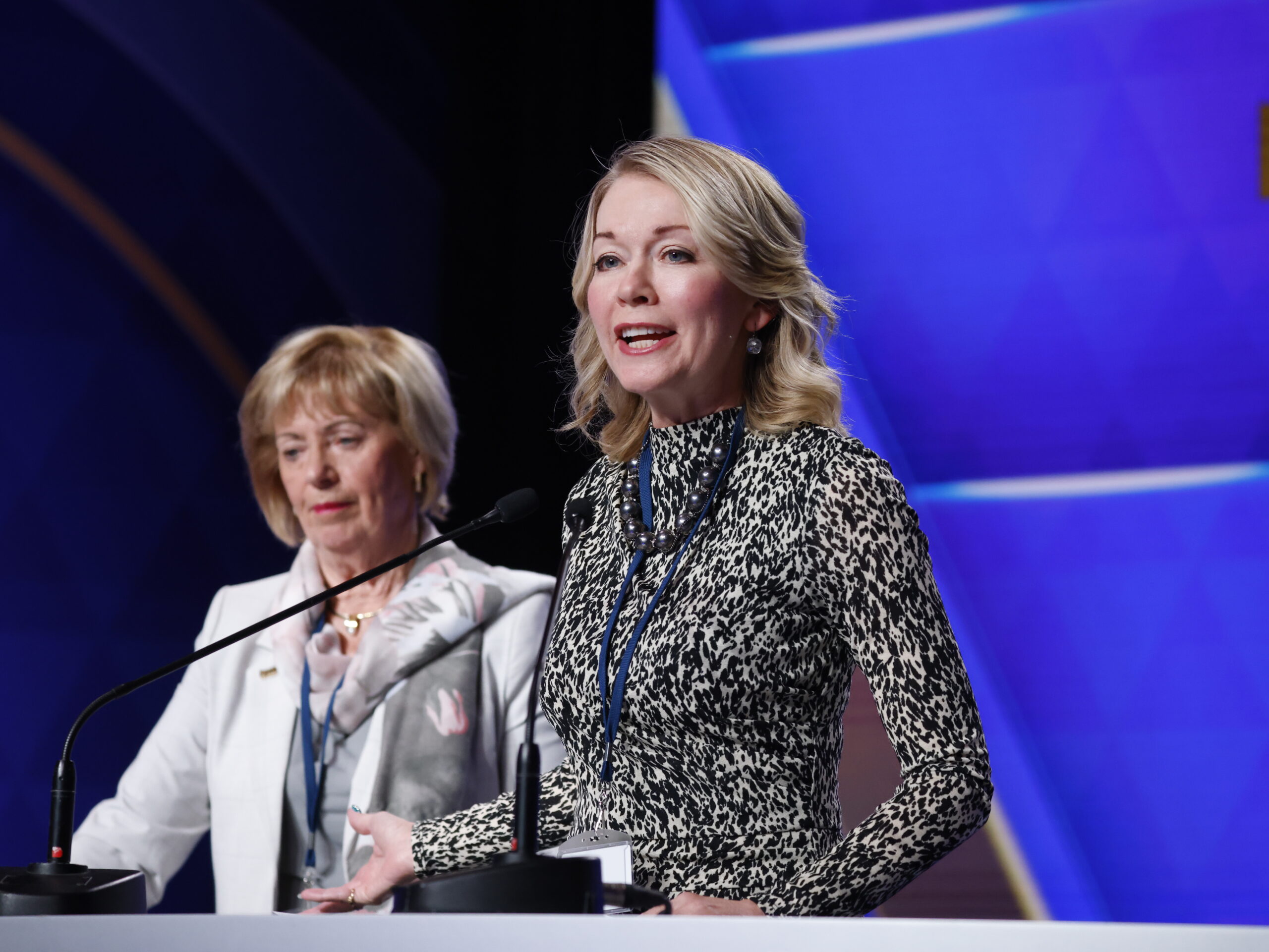
In her speech, Candice Bergen former Canadian Minister and leader of Conservative Party, addressing Maryam Rajavi, she said, “Your leadership is an inspiration to women and men. And I want to thank you for the way that you include men. We’re not saying women are against men in any way, shape, or form. We are together united for freedom, for democracy, for the values that we uphold. I’m celebrating today the women who are part of this movement, who have been put in positions of leadership by Madam Rajavi. You have put these women in positions of leadership not just as tokens, not to check a box, not to fill a quota, but to provide real leadership, strong decision-making capabilities because sometimes we women are like this, we say, ‘Can we do this? I’m not sure if I’m the one that should do this.’ And you have said to these women, ‘Yes, you can, and I believe in you, and I’m going to mentor you.’ And these women have risen up and provided such incredible leadership, servant leadership.”
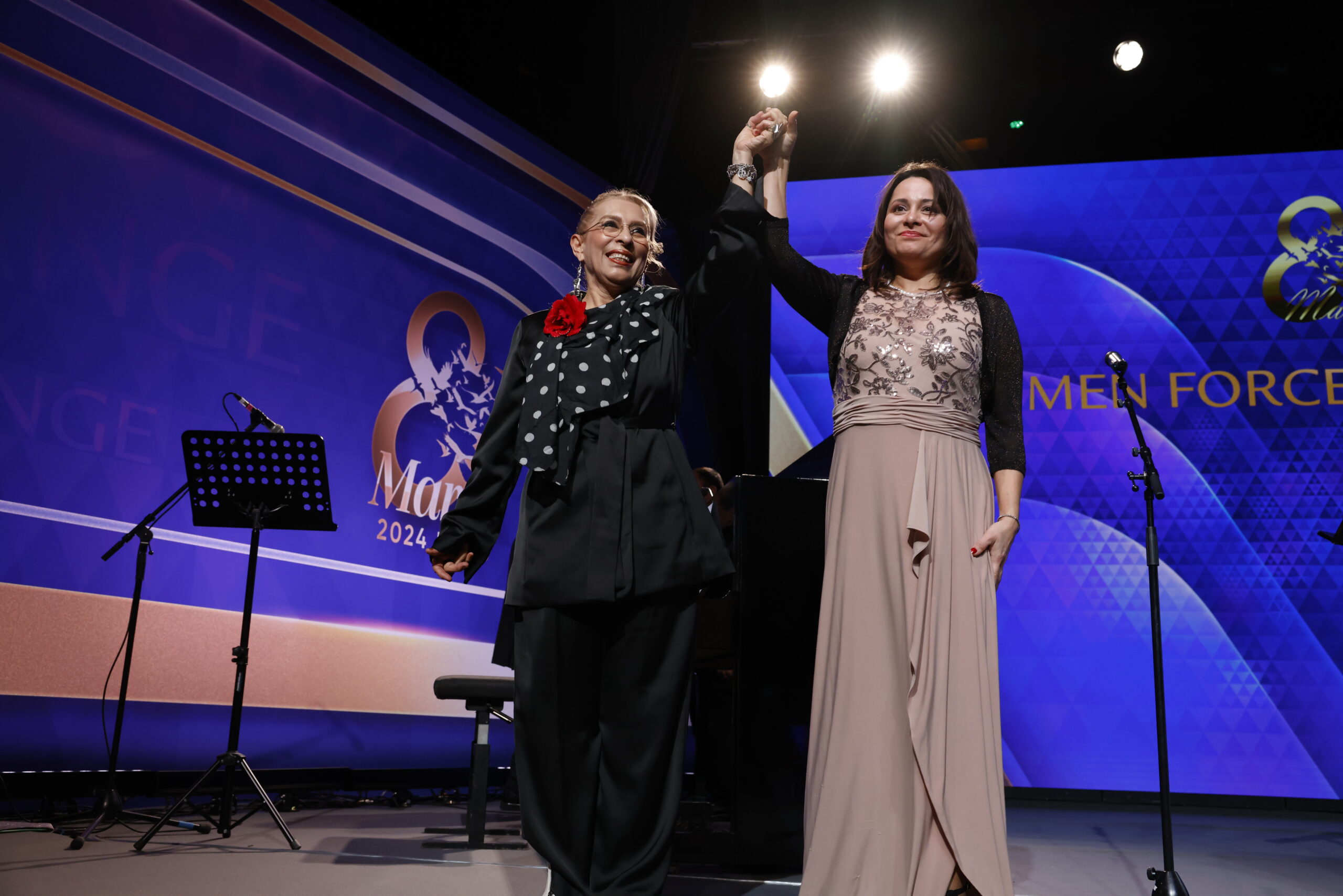
This magnificent gathering ended with music performances by two famous female singers of classical music, Gisou Shakeri from Iran and Maria Daneshvar from Afghanistan.
